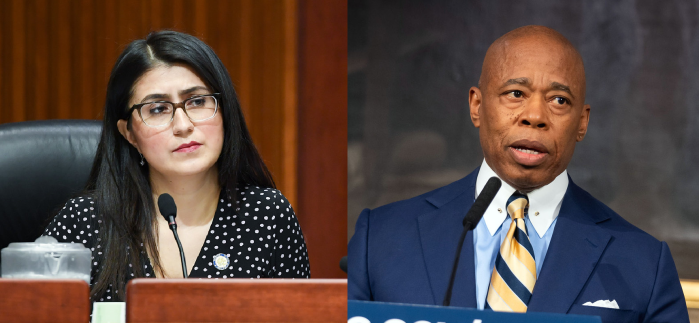By Thomas Tracy
Political party bosses once revered for their unfettered discretion in making or breaking Supreme Court judges were reduced to toothless tigers following a groundbreaking decision by a federal judge, who declared such practices unconstitutional. In Friday’s decision, which is expected to be appealed, Judge John Gleeson took the power of selecting judges from party bosses and gave it back to the people in a primary process – something reformers like Surrogate Court Judge Margarita Lopez Torres have been demanding for several years. Before Friday, Supreme Court candidates in Brooklyn were selected by a screening panel, usually headed by a party boss. Once the screening panel approves a list of candidates, those names are put on the ballot and ultimately elected. Reformers, however, said that the party selection system takes the power away from the people, who have no choice but to rubberstamp the candidates that the political party has already selected. Judge Gleeson agreed, and issued a preliminary injunction to the state Board of Elections, barring them from continuing with the party selection system in the near future. If the injunction beats an appeal, the next batch of Supreme Court judicial candidates will be selected through a primary. “Local major party leaders — not the voters or the delegates to the judicial nominating conventions — control who becomes a Supreme Court justice and when,” Gleeson wrote in his 77-page decision. “The highly unusual process by which that extremely important office is filled perpetuates that control, and deprives the voters of any meaningful role.” Gleeson was responding to a case filed by the Brennan Center for Justice in March of 2004 on behalf of several plaintiffs, including then Civil Court Judge and now Surrogate Court Judge Torres, Common Cause/NY, and several voters across the State. The named defendant is the New York State Board of Elections. When the case was heard, the Association of Supreme Court Justices, the New York County Democratic Committee, and the New York State Republican Party all intervened to defend the status quo. In their case, the Brennan Center for Justice showed that out of the 33 states which elect judges through contestable elections, New York is the only one that nominates candidates through a convention system – meaning that the party leaders handpick the party nominees. The decision comes at a time when one time judge-maker Clarence Norman Jr., has been convicted of a series of campaign violations and Assemblyman Vito Lopez, the new chair of the Kings County Democratic Party promised reforms in how judicial candidates are selected. In previous interviews, Lopez said that the panel that would streamline the borough’s judicial selection process was going to hold open sessions for public input. As of this writing, those sessions have not been publicly announced. Calls to Lopez’s office for comment on Judge Gleeson’s decision were not returned as this paper went to press. Judge Torres called Gleeson’s decision “a victory for the judiciary and all New Yorkers and candidates who are well qualified, but get shut out.” “In finding this closed system unconstitutional under the First and Fourteenth Amendments, Judge Gleeson has not only righted a significant wrong, but he has also strengthened our judiciary,” said Jeremy Creelan, co-lead counsel for the Brennan Center for Justice. “Under the current system, judges are beholden to party leaders and many well-qualified lawyers are never even considered for judgeships because they have no ties to party leaders. By allowing well-qualified candidates for Supreme Court who do not have such ties to compete for their party’s nomination, this ruling will help restore confidence in our courts ability to dispense justice fairly and impartially.” “It’s a great day for democracy in Brooklyn and the whole state,” said Alan Fleishman, the male Democratic district leader for the 52nd Assembly District in Park Slope told the New York Times. Fleishman, the former president of Lambda Independent Democrats has demanded changes in the judicial selection process for years. “Voters will no longer have their judges chosen by party bosses. They’ll get more candidates to choose from. They’ll get the power to look at qualifications. They’ll get to make decisions on their own.” The city’s Corporation Counsel Michael A. Cardozo said that Judge Gleeson’s decision “confirms what Mayor Michael Bloomberg has been saying repeatedly.” “The decision makes even more urgent the need for legislation that will ensure that only the most highly qualified people serve in our courts,” said Cardozo. “It is time to put an end to the backroom deals that should have died with Tammany Hall.”

































